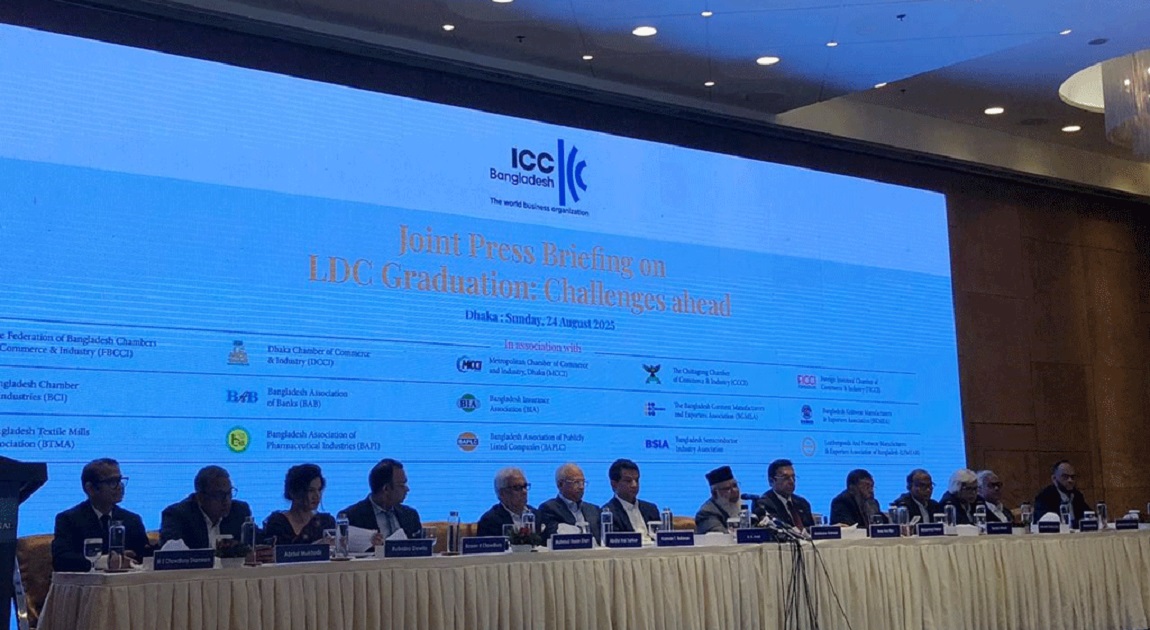Top business organizations in Bangladesh have urged the government to postpone the country’s graduation from the Least Developed Country (LDC) status by three to five years.
They argue that additional time is needed to prepare for the loss of duty-free trade privileges, address challenges in the pharmaceutical and ready-made garment (RMG) sectors, and strengthen the economy amid current financial difficulties.
The demand was made at a press conference held on Sunday (24 August) at the InterContinental Hotel in Dhaka, organized by the International Chamber of Commerce (ICC) Bangladesh under the theme “LDC Graduation: Challenges Ahead.”
Representatives from major trade bodies—including FBCCI, DCCI, MCCI, BGMEA, BKMEA, and BTMA—participated.
In a written statement, ICC Bangladesh President Mahbubur Rahman said that while the business community welcomes LDC graduation, he stressed the need for an additional three to five years to ensure smooth preparation.
Bangladesh is on track to graduate from LDC status in November 2026 after meeting the UN’s three criteria—per capita income, human assets index, and economic vulnerability index—in two consecutive reviews.
Rahman warned that despite being a national achievement, graduation carries significant risks. Following graduation, duty-free privileges in key markets such as the European Union and the UK could be withdrawn, potentially reducing exports by 6 to 14 percent.
Special benefits under the World Trade Organization (WTO), including export subsidies and TRIPS exemptions, would also end. Bangladesh would need to access loans at market rates, increasing debt repayment pressure.
The pharmaceutical and RMG sectors are likely to face the most significant challenges. Bangladesh’s pharmaceutical industry currently meets 98 percent of domestic demand and exports to over 150 countries, benefiting from intellectual property exemptions. Post-graduation, the cost of life-saving drugs, including cancer and HIV medicines, could rise sharply; for instance, the monthly cost of the cancer drug Imatinib could surge from $30–40 to $2,000–3,000.
The RMG sector, which contributes over 81 percent of total export earnings, will face heightened competition due to the withdrawal of duty-free benefits, higher production costs, and stricter compliance requirements.
Rahman also highlighted the broader economic challenges, including high non-performing loans in the banking sector, a 13 percent decline in net foreign direct investment in 2024 compared to Vietnam’s $38.23 billion, energy shortages, logistics weaknesses, and a 45 percent devaluation of the Taka against the US dollar. Since the July 2024 public uprising, the repayment pressure on $103 billion in external debt has further strained the economy.
Other speakers noted that several countries have delayed their LDC graduation to prepare adequately: the Maldives postponed by 8 years, Vanuatu by 20 years, and Nepal by 5 years. Myanmar and Timor-Leste, though eligible, have deferred graduation due to political instability.
Fifteen top trade organizations, including FBCCI, BGMEA, BKMEA, and MCCI, jointly called for delaying graduation.
They emphasized in a statement that the issue is not whether graduation will occur, but how it will be managed. While graduation is inevitable, success depends on how quickly and collectively the country prepares.













-20260226080139.webp)






-20260225072312.webp)








-20260219054530.webp)
-20260224075258.webp)




-20260221022827.webp)